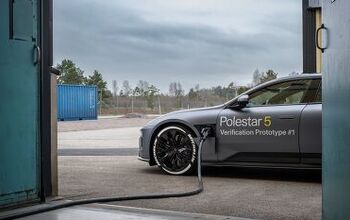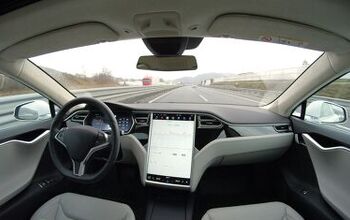The Future Is….Wet
When BMW unveiled its 750hL earlier this year, the media response was muted. This despite the fact that the 750hL is the world's first production-ready hydrogen powered passenger car. Well, hydrogen and petrol, and, um, it's actually super-cooled hydrogen, but hey, we are talking about a luxury car that can steam from zero to sixty in 9.6 seconds and drive 300 kilometres between fill-ups, without a single harmful emission.
Sure, a few "challenges" remain before the 750hL will replace the semi-electric Toyota Prius as the tree hugger's favourite. At the moment, only two specialist filling stations offer super-cooled hydrogen (LA and Munich). There are "safety issues" surrounding the use of a fuel that can freeze your fingers right off. Even so, BMW's self-confessed "transitional vehicle" marks the global automotive industry's path towards a hydrogen-powered future.
GM, Ford, Daimler-Chrysler Volkswagen, Nissan and Toyota are all committed to selling zero emissions, hydrogen-powered cars by 2010. Which raises an interesting question. Why? Considering the gigantic cost and Herculean hassle of creating an entirely new means of propulsion, you'd think car manufacturers would prefer to clean up the existing petrol engine and call it good. And so they would. If they could. But they can't. Blame– or thank– California.
In the 1970's, California forced car manufacturers to lower emissions. Regulators established a precedent (foreshadowed by Ralph Nader): politics dictating automotive development. In other words, the free market was cut out of the action. Now that the world has decided that Global Warming exists and SOMETHING MUST BE DONE, something will.
Hydrogen is the left leaning environmentalist's fuel of choice. The power to convert water into hydrogen and oxygen gas can come from anywhere: solar, wind, thermal, tidal, nuclear, even rotting garbage. Replacing the western world's 100 million plus petrol-driven cars with hydrogen-powered vehicles could trigger the long-awaited, politically correct development of renewable energy sources.
More important to those on the other side of the political spectrum, such a diverse hydrogen infrastructure would free the western world from the financial, military and political cost of drilling, refining and distributing Middle Eastern petrochemicals.
September 11th gave both sides in the pro-hydrogen camp new impetus. America and its allies finally woke up to the possibility– the necessity– of reducing its dependence on foreign oil. Hydrogen power suddenly became a national priority.
If only. While recent events have liberated new funds for hydrogen research, war is still the more practical option. Manufacturers have several hurdles before they can even think about filling the new world's hydrogen order. First, they need to perfect the hydrogen fuel cell.
Size matters. The most efficient fuel cells are two to three times larger than a conventional petrol engine. That's fine for a bus, but not a car. Case in point: Ford's Focus FCV (Fuel Cell Vehicle). Engineers had to raise the floor and eliminate the boot to fit a 22-gallon hydrogen tank. The resulting FCV weighs 1200lbs. more than it gasoline-powered equivalent, travels just 100 miles between fill-ups, and it's not even on the same performance planet as the Focus RS.
Car manufacturers and lawmakers alike are throwing billions of pounds at universities and R&D departments in the search for a smaller, more powerful hydrogen fuel cell. So far, so bad.
Meanwhile, GM estimates that a suitable fuel cell would be two to three times as expensive as a gasoline engine. Industry cheerleaders claim that costs will decrease as the market expands, like they did for mobile phones and PC's. Manufacturing techniques would have to evolve quickly, and the Marketing Men would have to convince millions of people their hydrogen car will not Hindenburg.
There's only one way to accelerate the process: raise the price of gasoline to levels that would give "Red" Ken Livingstone wet dreams. Political suicide. Anyway, even if a practical, cost-effective hydrogen technology existed, who's going to pay for all those new filling stations?
The smart money is on the oil companies. BP, Shell, Texaco and Exxon. All the big oil companies are looking to build hydrogen production plants next to their oil refineries. The power to transform water into hydrogen gas would come from… oil. To remove pollution from the process, carbon wastes would be removed at the well or refinery, and then buried underground. While Greenpeace and chums aren't buying "carbon sequestration", it's not a debate destined to mobilise the masses.
The idea of using Middle Eastern oil to make hydrogen to fuel zero emissions passenger cars is bizarre, to say the least. But like the BMW 750hL itself, it's the unavoidable short-term bridge between the current set-up, and the one to come. Given the political climate, resistance to the concept is unlikely. In fact, providing BMW removes the iDrive and brings down the zero to sixty times, even petrolheads may be ready to face a hydrogen-powered future.
More by Robert Farago
Latest Car Reviews
Read moreLatest Product Reviews
Read moreRecent Comments
- Teddyc73 Oh look dull grey with black wheels. How original.
- Teddyc73 "Matte paint looks good on this car." No it doesn't. It doesn't look good on any car. From the Nissan Versa I rented all the up to this monstrosity. This paint trend needs to die before out roads are awash with grey vehicles with black wheels. Why are people such lemmings lacking in individuality? Come on people, embrace color.
- Flashindapan Will I miss the Malibu, no. Will I miss one less midsize sedan that’s comfortable, reliable and reasonably priced, yes.
- Theflyersfan I used to love the 7-series. One of those aspirational luxury cars. And then I parked right next to one of the new ones just over the weekend. And that love went away. Honestly, if this is what the Chinese market thinks is luxury, let them have it. Because, and I'll be reserved here, this is one butt-ugly, mutha f'n, unholy trainwreck of a design. There has to be an excellent car under all of the grotesque and overdone bodywork. What were they thinking? Luxury is a feeling. It's the soft leather seats. It's the solid door thunk. It's groundbreaking engineering (that hopefully holds up.) It's a presence that oozes "I have arrived," not screaming "LOOK AT ME EVERYONE!!!" The latter is the yahoo who just won $1,000,000 off of a scratch-off and blows it on extra chrome and a dozen light bars on a new F150. It isn't six feet of screens, a dozen suspension settings that don't feel right, and no steering feel. It also isn't a design that is going to be so dated looking in five years that no one is going to want to touch it. Didn't BMW learn anything from the Bangle-butt backlash of 2002?
- Theflyersfan Honda, Toyota, Nissan, Hyundai, and Kia still don't seem to have a problem moving sedans off of the lot. I also see more than a few new 3-series, C-classes and A4s as well showing the Germans can sell the expensive ones. Sales might be down compared to 10-15 years ago, but hundreds of thousands of sales in the US alone isn't anything to sneeze at. What we've had is the thinning of the herd. The crap sedans have exited stage left. And GM has let the Malibu sit and rot on the vine for so long that this was bound to happen. And it bears repeating - auto trends go in cycles. Many times the cars purchased by the next generation aren't the ones their parents and grandparents bought. Who's to say that in 10 years, CUVs are going to be seen at that generation's minivans and no one wants to touch them? The Japanese and Koreans will welcome those buyers back to their full lineups while GM, Ford, and whatever remains of what was Chrysler/Dodge will be back in front of Congress pleading poverty.




































Comments
Join the conversation
When I see a hydrogen car for sale at a local dealer here in Tampa then I will know its for real like a hybrid until then its still another Chrysler turbine fantasy.